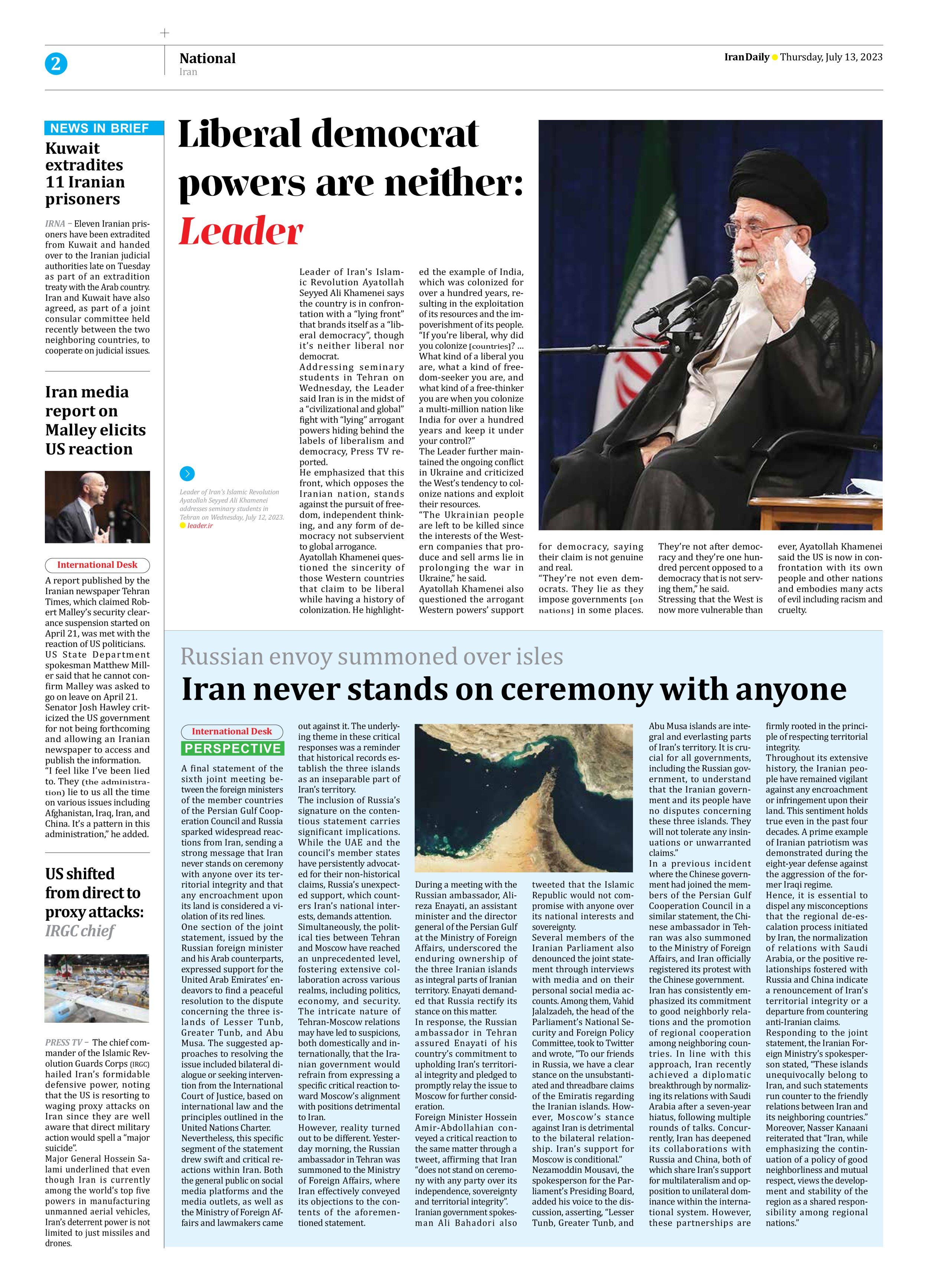
Russian envoy summoned over isles
Iran never stands on ceremony with anyone
International Desk
PERSPECTIVE
A final statement of the sixth joint meeting between the foreign ministers of the member countries of the Persian Gulf Cooperation Council and Russia sparked widespread reactions from Iran, sending a strong message that Iran never stands on ceremony with anyone over its territorial integrity and that any encroachment upon its land is considered a violation of its red lines.
One section of the joint statement, issued by the Russian foreign minister and his Arab counterparts, expressed support for the United Arab Emirates’ endeavors to find a peaceful resolution to the dispute concerning the three islands of Lesser Tunb, Greater Tunb, and Abu Musa. The suggested approaches to resolving the issue included bilateral dialogue or seeking intervention from the International Court of Justice, based on international law and the principles outlined in the United Nations Charter.
Nevertheless, this specific segment of the statement drew swift and critical reactions within Iran. Both the general public on social media platforms and the media outlets, as well as the Ministry of Foreign Affairs and lawmakers came out against it. The underlying theme in these critical responses was a reminder that historical records establish the three islands as an inseparable part of Iran’s territory.
The inclusion of Russia’s signature on the contentious statement carries significant implications. While the UAE and the council’s member states have persistently advocated for their non-historical claims, Russia’s unexpected support, which counters Iran’s national interests, demands attention.
Simultaneously, the political ties between Tehran and Moscow have reached an unprecedented level, fostering extensive collaboration across various realms, including politics, economy, and security. The intricate nature of Tehran-Moscow relations may have led to suspicions, both domestically and internationally, that the Iranian government would refrain from expressing a specific critical reaction toward Moscow’s alignment with positions detrimental to Iran.
However, reality turned out to be different. Yesterday morning, the Russian ambassador in Tehran was summoned to the Ministry of Foreign Affairs, where Iran effectively conveyed its objections to the contents of the aforementioned statement.
During a meeting with the Russian ambassador, Alireza Enayati, an assistant minister and the director general of the Persian Gulf at the Ministry of Foreign Affairs, underscored the enduring ownership of the three Iranian islands as integral parts of Iranian territory. Enayati demanded that Russia rectify its stance on this matter.
In response, the Russian ambassador in Tehran assured Enayati of his country’s commitment to upholding Iran’s territorial integrity and pledged to promptly relay the issue to Moscow for further consideration.
Foreign Minister Hossein Amir-Abdollahian conveyed a critical reaction to the same matter through a tweet, affirming that Iran “does not stand on ceremony with any party over its independence, sovereignty and territorial integrity”.
Iranian government spokesman Ali Bahadori also tweeted that the Islamic Republic would not compromise with anyone over its national interests and sovereignty.
Several members of the Iranian Parliament also denounced the joint statement through interviews with media and on their personal social media accounts. Among them, Vahid Jalalzadeh, the head of the Parliament’s National Security and Foreign Policy Committee, took to Twitter and wrote, “To our friends in Russia, we have a clear stance on the unsubstantiated and threadbare claims of the Emiratis regarding the Iranian islands. However, Moscow’s stance against Iran is detrimental to the bilateral relationship. Iran’s support for Moscow is conditional.”
Nezamoddin Mousavi, the spokesperson for the Parliament’s Presiding Board, added his voice to the discussion, asserting, “Lesser Tunb, Greater Tunb, and Abu Musa islands are integral and everlasting parts of Iran’s territory. It is crucial for all governments, including the Russian government, to understand that the Iranian government and its people have no disputes concerning these three islands. They will not tolerate any insinuations or unwarranted claims.”
In a previous incident where the Chinese government had joined the members of the Persian Gulf Cooperation Council in a similar statement, the Chinese ambassador in Tehran was also summoned to the Ministry of Foreign Affairs, and Iran officially registered its protest with the Chinese government.
Iran has consistently emphasized its commitment to good neighborly relations and the promotion of regional cooperation among neighboring countries. In line with this approach, Iran recently achieved a diplomatic breakthrough by normalizing its relations with Saudi Arabia after a seven-year hiatus, following multiple rounds of talks. Concurrently, Iran has deepened its collaborations with Russia and China, both of which share Iran’s support for multilateralism and opposition to unilateral dominance within the international system. However, these partnerships are firmly rooted in the principle of respecting territorial integrity.
Throughout its extensive history, the Iranian people have remained vigilant against any encroachment or infringement upon their land. This sentiment holds true even in the past four decades. A prime example of Iranian patriotism was demonstrated during the eight-year defense against the aggression of the former Iraqi regime.
Hence, it is essential to dispel any misconceptions that the regional de-escalation process initiated by Iran, the normalization of relations with Saudi Arabia, or the positive relationships fostered with Russia and China indicate a renouncement of Iran’s territorial integrity or a departure from countering anti-Iranian claims.
Responding to the joint statement, the Iranian Foreign Ministry’s spokesperson stated, “These islands unequivocally belong to Iran, and such statements run counter to the friendly relations between Iran and its neighboring countries.” Moreover, Nasser Kanaani reiterated that “Iran, while emphasizing the continuation of a policy of good neighborliness and mutual respect, views the development and stability of the region as a shared responsibility among regional nations.”







